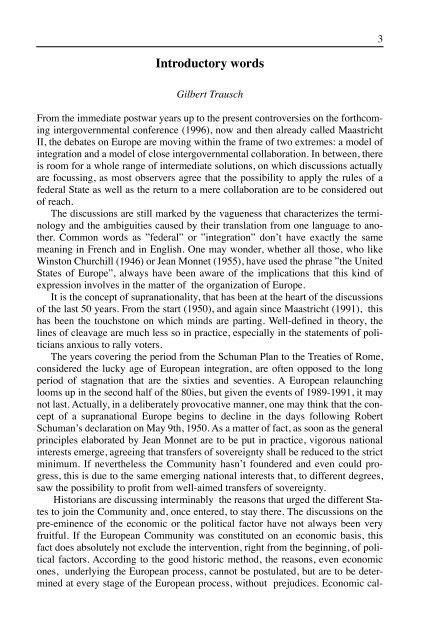number 1 - Centre d'études et de recherches européennes Robert ...
number 1 - Centre d'études et de recherches européennes Robert ...
number 1 - Centre d'études et de recherches européennes Robert ...
Create successful ePaper yourself
Turn your PDF publications into a flip-book with our unique Google optimized e-Paper software.
Introductory note – Introduction – Einführung 3<br />
Introductory words<br />
Gilbert Trausch<br />
From the immediate postwar years up to the present controversies on the forthcoming<br />
intergovernmental conference (1996), now and then already called Maastricht<br />
II, the <strong>de</strong>bates on Europe are moving within the frame of two extremes: a mo<strong>de</strong>l of<br />
integration and a mo<strong>de</strong>l of close intergovernmental collaboration. In b<strong>et</strong>ween, there<br />
is room for a whole range of intermediate solutions, on which discussions actually<br />
are focussing, as most observers agree that the possibility to apply the rules of a<br />
fe<strong>de</strong>ral State as well as the r<strong>et</strong>urn to a mere collaboration are to be consi<strong>de</strong>red out<br />
of reach.<br />
The discussions are still marked by the vagueness that characterizes the terminology<br />
and the ambiguities caused by their translation from one language to another.<br />
Common words as ”fe<strong>de</strong>ral” or ”integration” don’t have exactly the same<br />
meaning in French and in English. One may won<strong>de</strong>r, wh<strong>et</strong>her all those, who like<br />
Winston Churchill (1946) or Jean Monn<strong>et</strong> (1955), have used the phrase ”the United<br />
States of Europe”, always have been aware of the implications that this kind of<br />
expression involves in the matter of the organization of Europe.<br />
It is the concept of supranationality, that has been at the heart of the discussions<br />
of the last 50 years. From the start (1950), and again since Maastricht (1991), this<br />
has been the touchstone on which minds are parting. Well-<strong>de</strong>fined in theory, the<br />
lines of cleavage are much less so in practice, especially in the statements of politicians<br />
anxious to rally voters.<br />
The years covering the period from the Schuman Plan to the Treaties of Rome,<br />
consi<strong>de</strong>red the lucky age of European integration, are often opposed to the long<br />
period of stagnation that are the sixties and seventies. A European relaunching<br />
looms up in the second half of the 80ies, but given the events of 1989-1991, it may<br />
not last. Actually, in a <strong>de</strong>liberately provocative manner, one may think that the concept<br />
of a supranational Europe begins to <strong>de</strong>cline in the days following <strong>Robert</strong><br />
Schuman’s <strong>de</strong>claration on May 9th, 1950. As a matter of fact, as soon as the general<br />
principles elaborated by Jean Monn<strong>et</strong> are to be put in practice, vigorous national<br />
interests emerge, agreeing that transfers of sovereignty shall be reduced to the strict<br />
minimum. If nevertheless the Community hasn’t foun<strong>de</strong>red and even could progress,<br />
this is due to the same emerging national interests that, to different <strong>de</strong>grees,<br />
saw the possibility to profit from well-aimed transfers of sovereignty.<br />
Historians are discussing interminably the reasons that urged the different States<br />
to join the Community and, once entered, to stay there. The discussions on the<br />
pre-eminence of the economic or the political factor have not always been very<br />
fruitful. If the European Community was constituted on an economic basis, this<br />
fact does absolutely not exclu<strong>de</strong> the intervention, right from the beginning, of political<br />
factors. According to the good historic m<strong>et</strong>hod, the reasons, even economic<br />
ones, un<strong>de</strong>rlying the European process, cannot be postulated, but are to be d<strong>et</strong>ermined<br />
at every stage of the European process, without prejudices. Economic cal-

















